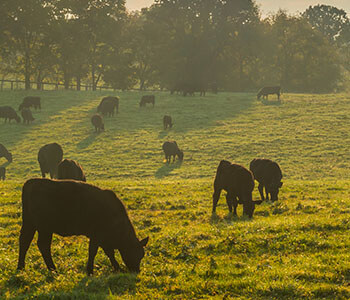Brush & Weed Control in Pastures
Feb 24, 2020

Prairie meadows and native pasture provide relatively inexpensive supplemental forage for livestock and is a very valuable asset to Kansas producers. Native pastures and hay meadows, however, require occasional maintenance to be as productive as possible. Limiting competition from non-forage species is one factor required for sustained high quality and forage yield.
Broadleaf weeds, grassy weeds, shrubs and other woody plants will eventually dominant a pasture if left unmanaged. There are several options to consider when maintaining your pasture- proper timing, proper means, and if using chemicals, proper choice and timing of herbicides. A key factor in success is understanding each species needing control and the stage in their development when they are most vulnerable.
Weeds-examples of weeds common in rangeland and pastures in Kansas include annual species such as lance-leaf ragweed and common broomweed. Biennial plants, those that take 2 years to complete their life cycle, include musk thistle and common mullein. Troublesome perennial weed species include sericea lespedeza, poison hemlock, and goldenrods.
Grasses such as prairie three-awn, long-spine sandbur, Johnsongrass.
Shrubs such as buckbrush, smooth sumac, sand plum, blackberry and multiflora rose.
Trees such as common honey locust, Osage orange, and eastern redcedar, may become problems on range and pastureland. Other species to watch for include black locust, honeysuckle, and trumpet vine.
A helpful identification guide from Kansas State University is found at
https://www.southeast.k-state.edu/program_areas/crop_production/weeds/ppt-ks-weed-id.pdf
A reliable source of information for chemical choices is the 2020 Chemical Weed Control for Field Crops, Pasture, Rangeland and Noncropland from KSRE and available through the Extension Office nearest you or on-line.
Control & Management
Options for control and management of brush and weed species include:
Other options include: Spike granular- applied (scattered) onto the soil around the dripline of small trees, Garlon Ultra as a basal bark or cut-stump treatment, or foliar sprays containing mixtures of 2,4-D, dicamba or Tordon products. Use of an approved surfactant can improve foliar absorption, especially under dry conditions. Always plan your timing to reduce the possibility of drift when using foliar sprays.
Cut-stump measures of sprouting species such as Osage orange, mulberry, honey locust, will require a small amount of herbicide, properly placed on the outer edge, to prevent sprouting. Remedy Ultra herbicide mixed with crop oil or diesel fuel is most effective. The pre-mixed, ready-to-use product is Garlon Ultra. Clusters of small trees can be treated in fall or late winter by herbicides applied to the lower 12-18” of the trunk bark. Crop Oil additives will enhance absorption into the bark. Trees will normally not exhibit symptoms until beginning growth the following spring. This is called “basal bark” treatment.

Broadleaf weeds, grassy weeds, shrubs and other woody plants will eventually dominant a pasture if left unmanaged. There are several options to consider when maintaining your pasture- proper timing, proper means, and if using chemicals, proper choice and timing of herbicides. A key factor in success is understanding each species needing control and the stage in their development when they are most vulnerable.
Weeds-examples of weeds common in rangeland and pastures in Kansas include annual species such as lance-leaf ragweed and common broomweed. Biennial plants, those that take 2 years to complete their life cycle, include musk thistle and common mullein. Troublesome perennial weed species include sericea lespedeza, poison hemlock, and goldenrods.
Grasses such as prairie three-awn, long-spine sandbur, Johnsongrass.
Shrubs such as buckbrush, smooth sumac, sand plum, blackberry and multiflora rose.
Trees such as common honey locust, Osage orange, and eastern redcedar, may become problems on range and pastureland. Other species to watch for include black locust, honeysuckle, and trumpet vine.
A helpful identification guide from Kansas State University is found at
https://www.southeast.k-state.edu/program_areas/crop_production/weeds/ppt-ks-weed-id.pdf
A reliable source of information for chemical choices is the 2020 Chemical Weed Control for Field Crops, Pasture, Rangeland and Noncropland from KSRE and available through the Extension Office nearest you or on-line.
Control & Management
Options for control and management of brush and weed species include:
- Chemical approaches (herbicides), Surmount, PastureGard HL, GrazonNext HL, Remedy Ultra
- Grazing management
- Mechanical
- Prescribed burning
Other options include: Spike granular- applied (scattered) onto the soil around the dripline of small trees, Garlon Ultra as a basal bark or cut-stump treatment, or foliar sprays containing mixtures of 2,4-D, dicamba or Tordon products. Use of an approved surfactant can improve foliar absorption, especially under dry conditions. Always plan your timing to reduce the possibility of drift when using foliar sprays.
Cut-stump measures of sprouting species such as Osage orange, mulberry, honey locust, will require a small amount of herbicide, properly placed on the outer edge, to prevent sprouting. Remedy Ultra herbicide mixed with crop oil or diesel fuel is most effective. The pre-mixed, ready-to-use product is Garlon Ultra. Clusters of small trees can be treated in fall or late winter by herbicides applied to the lower 12-18” of the trunk bark. Crop Oil additives will enhance absorption into the bark. Trees will normally not exhibit symptoms until beginning growth the following spring. This is called “basal bark” treatment.
